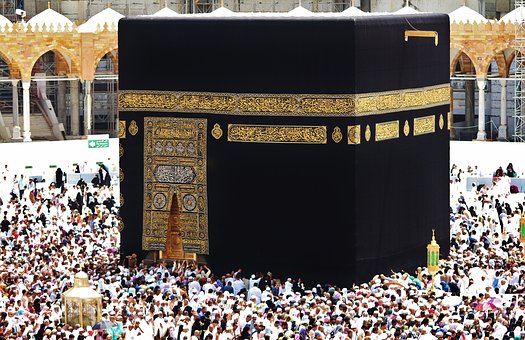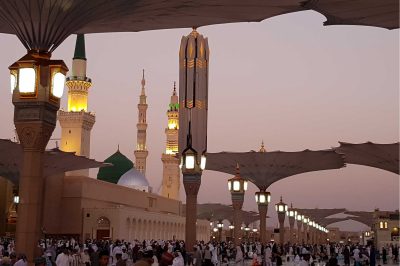Answer
Short Answer: It had nothing to do with the idols in the Kaabah and everything to do with showing that Islam is a continuation of Judaism and Christianity. Initially, Muslims were commanded to face both the Kaabah and Jerusalem. But, when Prophet Muhammad moved to Madinah, it was geographically and physically impossible to face both qiblahs at the same time, simply because Madinah is between Makkah and Jerusalem. So God ordered them to face Jerusalem to test their faith, since they dearly wanted to face Makkah. Then, right before the Battle of Badr which marked the true confrontation between truth and falsehood and the beginning of the collapse of idolatry, the Prophet received commands from his Lord to face the Kaabah again.
Salam Dear Nasim,
Thank you for your question and for contacting Ask About Islam.
I have actually read your question many times to make sure that I have grasped everything you needed a clarification about.
From what I have read, I understand that by the term ‘Baitul Muqaddas‘, you are referring to Al-Aqsa Mosque in Jerusalem.
Based on this understanding, I will answer your questions.
Stage 1: Al-Israa’ and Al-Miraj
This stage started from the event of Al-Israa’ and Al-Miraj (Night Journey and Ascension), the night in which five daily prayers were firstly prescribed.
On that day, Almighty Allah made it obligatory for Muslims to pray five times a day and that happened while the Prophet was still in Makkah.
The direction Muslims were commanded to face at that time was the Kaabah in Makkah, but turned toward Al-Aqsa Mosque in Jerusalem at the same time.
Obviously, facing the direction of Al-Aqsa Mosque while in Makkah means facing the Kaabah at the same time, simply because the geographical location of Makkah happens to be south east of Jerusalem and therefore, Muslims were facing two qiblahs at the one time. (Muhammed Abu Zahra, Khatim Al-Nabiyeen, Vol. 2, Dar Al-Fikr Al-Arabi, 2004 pp. 538)
This direction in which Muslims were facing both Kaabah and Al-Aqsa stressed the connection between Prophet Muhammad and Prophet Abraham (peace be upon them) and the connection between Prophet Muhammad and all Israelite Prophets including Moses and Jesus (peace be upon them).
Stage 2: Moving to Madinah
When Prophet Muhammad moved to Madinah, it was geographically and physically impossible to face both qiblahs at the same time, simply because Madinah is between Makkah and Jerusalem.
Therefore, Muslims were facing the direction of Al-Aqsa Mosque in Jerusalem as a fulfillment of Allah’s command and an indication of their full submission to His Will.
This was the test in which Muslims proved their full submission to Allah and acceptance of whatever He commands them to do.
They have proved how they understood their religion: all directions belong to Allah and to Him we should turn our hearts before our faces.
To Allah belongs the kingdom of earth and heavens and to Him all directions do belong.
A Muslim, as a part of this universe, belongs to His Creator and therefore, as part of this belonging, should turn his face wherever the Creator commands.
Obviously as explained in the Quran, the new stage where Muslims were facing Jerusalem was a test and one of the natures of a test is its being temporary; it is not the default.
The benefit of the test was to show people their own true colors and prove to them that they will be subject to an attack even from followers of close religions who live with them in the same society.
The test was to make them strong enough to bear that type of tribulations in the future and, more importantly, to give sometime for the Kaabah to be cleared from the idols that were surrounding it.
Deep from within, the Prophet was longing to face the qiblah of his father Abraham, and it seems as some commentators opine that he realized that the command to face Jerusalem was a temporary one and soon he would be commanded to turn his face to the Kaabah.
Stage 3: Before the Battle
After sixteen or seventeen months of facing Jerusalem, and right before the Battle of Badr which marked the true confrontation between truth and falsehood and the beginning of the collapse of idolatry, the Prophet received commands from his Lord to face the Kaabah again; i.e. to go back to the first qiblah.
The happiness of the Prophet and the Muslim community with the command was great and significant.
It proved to them that soon the idols will be removed from around the Kaabah and it will be purified.
Not long after that, the Prophet returned to Makkah and the Divine grace was completed upon him.
Regarding Idols
With regard to the issue of the idols around the Kaabah, it should be understood that the Prophet was not facing the idols; rather, he was facing the Kaabah and the idols were around, not inside or beside it.
As for the issue of the garbage around Al-Aqsa Mosque, it is historically mentioned.
Al-Aqsa mosque was established a long time ago before Prophet Muhammad and Prophet Moses.
It is said that it was established 40 years after the Holy Mosque in Makkah and some commentators say it was established during the time of Prophet Solomon.
This means that it was a mosque even before Prophet Muhammad and when Umar (may Allah be pleased with him) conquered Jerusalem to retake it, he was actually taking it as a mosque.
The garbage was a temporary thing piled around it by the Roman occupiers who disrespected the mosque.
May Allah return Al-Aqsa Mosque to us and hasten its liberation from the hands of its occupiers!
I hope this answers your question. Please keep in touch.
Salam.
(From Ask About Islam’s archives)
Read more…
The Qiblah and Unity of the Muslim Nation



